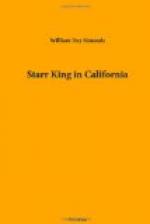It was an open secret among King’s friends in California that he meditated writing of the Yosemite as he had written of the White Hills of New Hampshire. Had he done so that region of incomparable beauty would have been known to the people of our country at least twenty years earlier. What a volume it would have been, “The Beauty and Glory of the Yosemite” by Starr King! What a vision he would have given us of that mighty gorge; of the crystal clearness of Mirror Lake; of the majesty of Cathedral Rock, of Sentinel Dome, or El Capitan; of the bright waterfalls, Vernal and the Bridal Veil; or in exquisite artistry of word painting how he would have pictured for us the wonderful coloring of the Yosemite, the morning tints of gray, the perfect white of noon shading into blue, the afternoon tinge of silver and gold, the sunset’s gauze of crimson, and then the varying shades of approaching night. But our artist never lived to paint the picture for us, and are we not the poorer? Is there any such thing in this sad world as superfluous genius? Let our philosophers answer. At all events these were the noble and the unfulfilled ambitions of Starr King.
It would seem that of American statesmen Mr. King most admired Daniel Webster. He never shared the feeling of his fellow abolitionists that Webster’s well-known longing to be President had caused him to be false to liberty, but rather that the great “Defender of the Constitution” endeavored to preserve the Union for the sake of liberty. As we have already noted, when the Civil War broke out King found in the service Webster had rendered the Nation some of his strongest arguments for the Northern Cause. He was quite ready to accept the judgment of the English publicist that “Webster was not only the greatest man of his age, — he was the greatest man of any age.” No doubt he had followed every stage of that momentous career to the very end. All thoughtful Americans went into retirement with Daniel Webster, and in his last sickness watched in a kind of reverent awe as his life ebbed away. From the solemn death chamber in Marshfield, his home by the stormy Atlantic, came tidings of the great statesman’s last moments, in which he repeated, again and again, the Lord’s Prayer and the Twenty-third Psalm. Loving friends bore tearful witness to the pathos and heavenly beauty of the old words as they fell from the trembling lips of the dying man, “Yea, though I walk through the valley of the shadow of death, I will fear no evil; for Thou art with me; Thy rod and Thy staff they comfort me.”
If it be a coincidence, it is one of striking appropriateness that when the last hour came to our foremost “Defender of the Constitution and the Union,” that with unclouded mind, here by the Pacific Sea, he, too, should have passed to his rest, even as the older patriot, whispering with untroubled faith, “The Lord is my shepherd; I shall not want. Yea, though I walk through the valley of the shadow of death, I will fear no evil.” “I will fear no evil,” these were his last words, and it is good to read that having so spoken, without a struggle or a pang, he entered upon his exceeding great reward. His work on earth was done, and well done.




